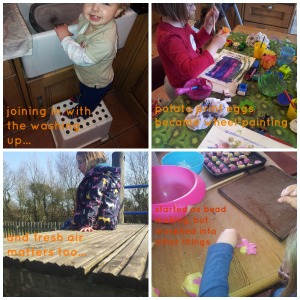There are often times when a little synchronicity in the Universe means that an issue that is preoccupying me personally is also keeping politicians and journalists busy too.
As a 40-something woman living in the developed world in the 21st century, I am many things, but above nearly all else, I am a unit of economic production. Now, please understand that I don’t measure myself in this way. The things I am most proud of – being a wife, mother, friend, volunteer, engaged member of the human race – do not earn me money. But the world, it seems, measures me thus.
Had my adult life begun in 1760, 1890, or even 1960, rather than in 1990, a working class girl such as I would not have accessed the educational or professional choices that have been relatively easy for me to aspire to. Elizabeth Bennet, or Marianne Dashwood, and no doubt their author Jane Austen, would have loved the opportunities that have become a norm to young women now. Just two generations ago, my grandfather was reluctant to pay comptometer college fees for his daughter because, by his reckoning, she’d be pregnant within a couple of years and it would be a waste of money. Luckily for her, her grandparents paid those fees instead, and my mother came to embody the triumph of determination over a very tough start in life (and a socio-political movement that had plenty of momentum). Thankfully, British society doesn’t tend to make room for such archaic views anymore. But – and without sounding depressingly anti-feminist about it – there are a just a few of commonly held views from back then that I find myself wishing we had hung on to. Top of the list? That the status of women as wives (partners) and mothers was respected. Everyone knew that these were tough jobs, and while the resistance to women doing anything else other than run a home and raise children was undeniably oppressive, no-one doubted that fulfilling these roles wasn’t the Hard Work we all know it to be.
To SAHM or not to SAHM
So, once upon a time, all we women had the option to be was a SAHM; these days, Staying At Home is a luxury many of us cannot afford. Back then, while the doors of industry and academia were closed to us, our contribution to society was nonetheless recognised and valued. Now, we get through many more doors than previously (though that heavy, leather-clad one that leads to the boardroom still seems a bit too stiff to push). But if we choose to stay behind our own front door, we no longer occupy a place in the world that attracts much appreciation. The Mother’s Day card says ‘Thank You’, but pretty much no-one else does.
The women who worked the land or pieced together munitions during the wars, or the ones who marched throughout the cities of the developed world a generation or so later, did so believing in Progress. But our campaigning grandmothers and mothers did not want our other roles so publicly diminished. Clearly. They were utterly right to fight for their daughter’s freedom to gain an education, to have a career. Of course we are equal to men, and should be treated as such. But, rather as Alice followed her curiosity from oddly-sized room to oddly-sized room, allowing herself to ‘drink this’ and ‘eat me’, there are convoluted, unintended consequences borne out of the feminist movement. And they are shaping my life, every single day. As we slot ourselves into the conventions that have always governed the patriarchy, there are sacrifices to be made. Most notably, that it will be the fiscal contribution I make to society, rather than any other, that determines my worth, while I walk this mortal coil.
Last week Sheryl Sandberg, CEO of Facebook, urged us all to ‘lean in’, to sit at more tables and raise more hands. She argued we are under-reaching, that our academic achievements are not being matched by our professional paths. We should, somehow, be able to do it all. Now, I don’t want to be overly negative about a woman who has obviously worked her socks off, and engaged brain as she did so. But. We don’t all get to do something that ‘flicks our switch’, as she does. She’s also reached a position where the financial recompense for her skillset very nearly tips over into ‘offensive’ to most of us mere average earners. Mortal women are busy working their arses off just to try and cover the food shop and the day nursery fees. Some of us are wondering why we bother.
And, seeing as we’ve digressed, they are ridiculous, those fees. Second most expensive in the world, so the statisticians tell us. All the politicians know this. They are frantically buzzing around Westminster trying to locate the solution, (which rock is it hiding underneath?) because they know that how most of us vote next time will be determined by this single policy decision. And it looks like the Conservative ministers (much to the chagrin of their party’s backbenchers, no doubt) have abandoned their long-held view that women with young children ought to be at home; the financial support they have announced is only available to families where both parents work. The agenda is obvious. For us to get out of the hole we are in, they need every single ‘unit of economic production’ back out there in the market place, peddling for all they are worth. They know they have to make going back to work a more attractive proposition for many women, and a tax break to help pay for the kids to be kept safe while we do, is the carrot they have dangled. The notion that we might actually let parents choose whatever works best for their particular family seems to have been lost, (and Frank Field’s more enlightened views are now, sadly, dead and buried).
Gigantic curveball
So this is what I am now, a ‘unit of economic production’, no more, no less. And last week, someone decided that the product of my labour was no longer required. Gigantic curveball doesn’t really cover it.
Unexpected. Out of the blue. Shocking.
Now I’ll be honest, the field I worked in genuinely engaged me, and I did care, do care, passionately, about what I did. But I often felt the culture, the climate I operated in, was stifling, and necessitated my feeling ethically compromised, from time to time. The lanyard round my neck felt a bit heavy. Mixed up with the feelings of despair at the impact on our family finances, is the sense of relief that comes with not having to be something I’m really not, anymore. It’s true that I had hoped to change direction – regular readers will know my blog is a facet of this – in the next couple of years. But the loss of status that has accompanied this event has caught me off guard, and is really the inspiration for this post.
You see, I’d gotten comfortable with wearing a badge that society doffed a cap to. My ego and I can at least admit that. Now it’s gone, I see how much it made me feel legitimate – a ‘proper little contributor’, don’t you know. More than anything this event is a loud warning claxon to my future working self. I’ve got 25, maybe 30 years left in the workplace, and I need to make them count. If I have no choice other than to be an economic producer, I need to make sure that I at least feel more aligned with the other parts of me that I, at least, do value; the part that thinks the best of me is demonstrated by my choosing to read one more picture book to my son; or spend an extra ten minutes making real cheese sauce for the tuna pasta bake for the kid’s tea; or freely giving an evening over to a committee meeting for my daughter’s pre-school.
I’m banking on Gaby Hinsliff’s prediction that ‘wifi is more liberating than the pill’. I’m staying positive, believing that I have skills and talents that are of use out there in the global marketplace. Besides, I want my children – one girl, one boy – to grow up knowing that their mother is not afraid to work hard on their behalf. I’m just hoping that society’s definition of work has a little more breadth and depth by the time it is their turn to join the ranks.







